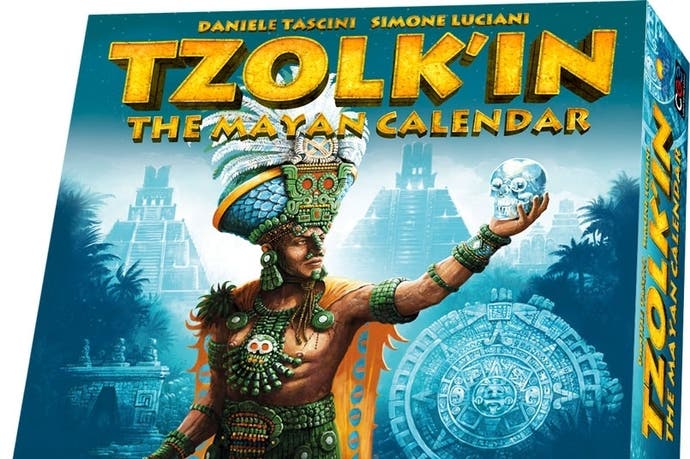Tzolk'in: The Mayan Calendar review
A very hot date.
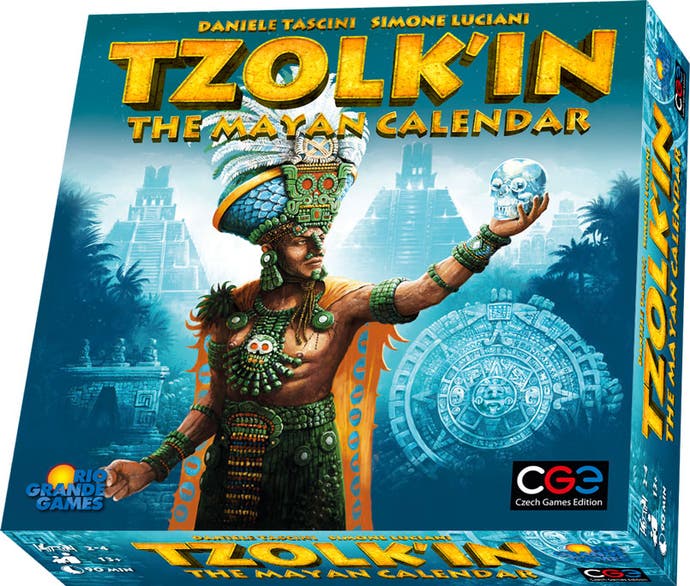
Price: £40 / Players: 2-4 / Time: 2 hours
How angsty are you about corn, usually? Pretty relaxed? Easygoing about corn, for the most part? Probably if a friend asked you "how's corn?" you'd respond that it's not a concern. You're doing pretty great.
Prepare to have your world turned upside-down. Tzolk'in: The Mayan Calendar is an incredible board game about managing Mayan tribes. Yes, the board looks properly Byzantine, and it's true that we're not in Monopoly territory any more. Granny need not be invited. The brother of yours who played Timesplitters once? Tell him you're washing your hair. Because you might need this in your life. If you have anything resembling an attention span, to play Tzolk'in is to have no doubt about its brilliance.
Getting worked up about mundane themes is a bit of a theme in itself in contemporary board gaming. Dyspeptic classic Thurn and Taxis is a good example: a game about running a 16th-century Bavarian postal service where failing to finish a route between Pilsen and Budweis brings on a feeling not unlike death. In the case of Tzolk'in, you could not be more emotionally invested in a corn cob unless you sat on one very fast.
Tzolk'in is what's called a "worker placement" game. Your table's covered in spaces offering luxurious rewards for your Mayan tribe, from great piles of lumber, to nudging you up a tech tree, to gold, to the metaphorical gold of precious corn and so much more.
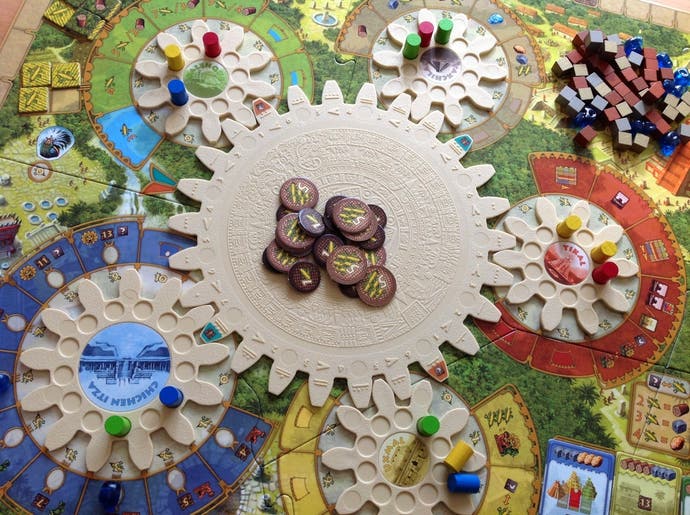
The board might look like the offspring of a maths textbook and an upsettlingly complicated Kinder Surprise, but your turn couldn't be simpler. Socket your limited number of "worker" tokens onto these spaces, then later, when you take them back, bring the space's reward back with them. A handful of wooden cubes, denoting resources. A fabulous crystal skull. Another worker (who you'll then have to feed). After 32 turns, whoever created the most fiendishly wealthy tribe is the winner.
The last board game review I did for Eurogamer, the darkly political City of Horror, I picked as demonstrative of the talking gameplay that board games alone can offer a seasoned video gamer. Tzolk'in is something very different. It's a "Euro game", part of a huge field of board games which see players neither in conflict nor working together, but rather politely shoulder-barging one another down the same mental obstacle course.
In other words, you're competing and playing together without once fighting. Never mind that it's designed to disarm the sulking, bickering and table-flipping at the heart of board games, it's one more area that video games often ignore, with their flat view of either co-op or competitive modes. Why can't we just... play the same game at the same time?
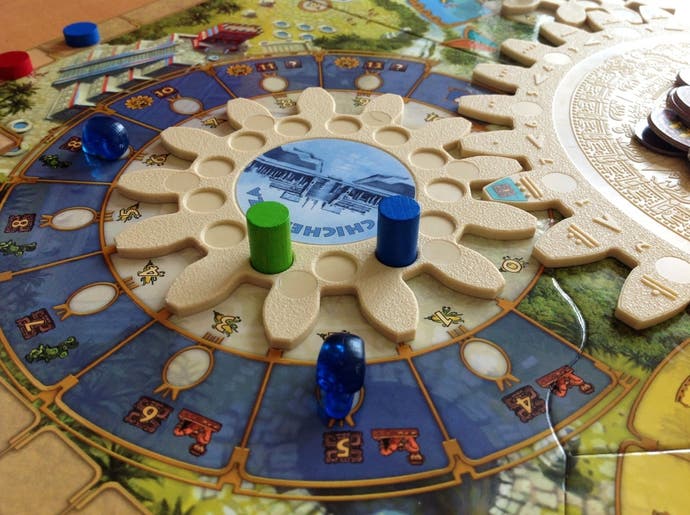
So, to recap: a long game of economic development with no fighting at all. Probably sounds dull, right? Oh Lord no. You're not seeing the terrible, barbed hook this game is about to trawl into your psyche.
Worker placement games engage for three reasons. On an immediate level, you're only ever being rewarded. Not only are you watching your tribe grow every turn, there's a sleepy haptic contentment derived from handling the components. You're socketing your workers into place, collecting little handfuls of wooden resources and swapping them for chunky cardstock buildings. In a manner comparable to twee sim video games, the game is either addictive because you're crafting an economy or because you're watching something grow, depending on whether you ask a competitive or happy-go-lucky player.
On a slightly higher level, you have a flinty, satisfying economic jinking where players move their plans to the board. It's the rush of realising that if you first collect that worker, you can increase your farming tech by one, then you can take back that other worker in the field for eight corn, and that's just enough to feed your workers! Two corn for each of them. A game of Tzolk'in is dozens of tiny victories of this nature, with each extra cube you furtively claim drawing you into the game further. Which probably sounds very nice, right?
Oh, no. That hook's still coming at you. You're doomed.
There's another layer beyond that. The second you decide you want more from Tzolk'in, you can become vindictive and evil.
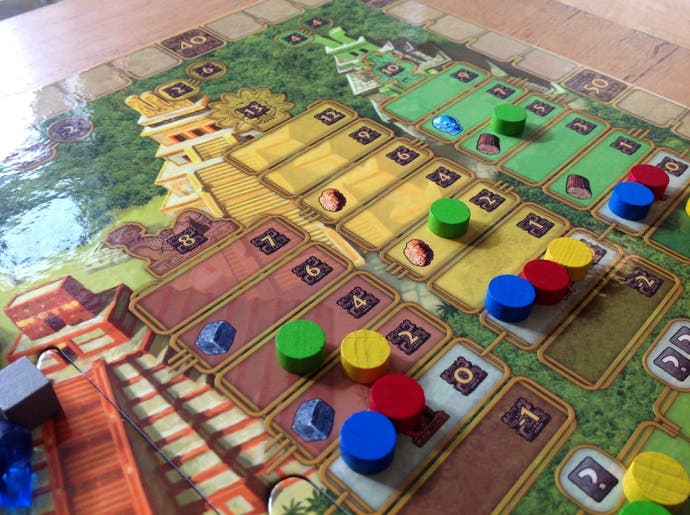
If you like, down to the individual turn you'd like to do it, Tzolk'in is a game of indescribably painful judo blocks. It's a game of watching your friends' faces as you build the monument they'd designed their whole tribe around or outstrip them for the favour of a god seconds before the reward is handed out. It's a game of birthing more workers and struggling to feed them, just so you can spread more of your ungainly mass into spaces your friends might want.
Or perhaps you could stay lightweight? It's entirely possibly to play Tzolk'in with the default three workers, never collecting any more, staying thin, sharp and smart, resisting other players' efforts to block you. Oh, there are teeth here. And in the case of Tzolk'in, there are teeth within teeth, like the mouth of the alien from Alien. But with more corn.
The teeth I'm talking about belong to the heavy plastic gears on the board, the game's principal innovation to the worker placement genre. Instead of simply taking the best slots for their workers, players insert them at the entry space on any of the five cogs. At the end of each turn of the game, you then rotate the beautiful central cog by one space, rotating all the other dials, and everyone's workers with them - a tactile pleasure on par with popping bubble wrap - moving them onto the next space on the board, which has a greater reward.
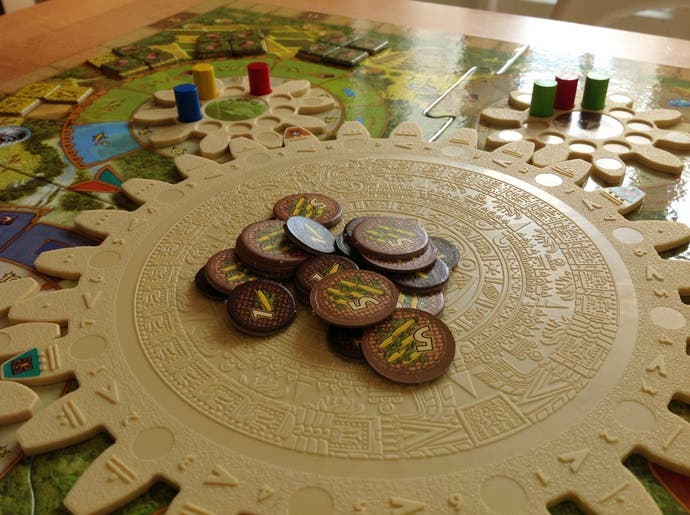
So the longer you leave any worker on a cog, the more mouth-watering the reward. As an evolution on worker placement, it's unsettlingly elegant. You've got this agonising test of patience as to how long you can stand waiting for your prize, a tricky slant on the economics you're puzzling over where you're questioning if you need the right resource or a resource right now. Meanwhile, players who enjoy dicking over their friends will thrill at their power to, once per game, rotate the central cog 2 spaces, the game literally spinning out of control.
Simply put, Tzolk'in represents a pinnacle of puzzling, of design, of a board game's joy as a physical object, and of this brand new genre of worker placement that we're still plumbing the depths of.
It's not just that it's a hypnotic challenge. It's also about how your friends' play will see various options closing and opening to you, making it different every time you play. And this is on top of the multiple paths to victory in Tzolk'in's rules - your tribe might pursue buildings, religious favour or the glossy immediacy of the crystal skulls dial. You might play with a taxing crowd of workers or none at all. You could advance your tech or ignore it. You could push blindly for your own wealth or detect your competitors' and try and shut them down.
There's just so much here. So much to play with and question.
It might not be for you. It's certainly not for players with no interest in locking their minds into a an exhausting two-hour bout with more numbers and possibilities than your average supermarket shop.
But if it is for you, you probably need it. This big, beautiful box is bending over backwards to please you. All you have to do is let it.
